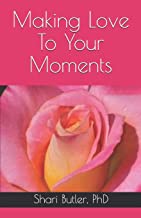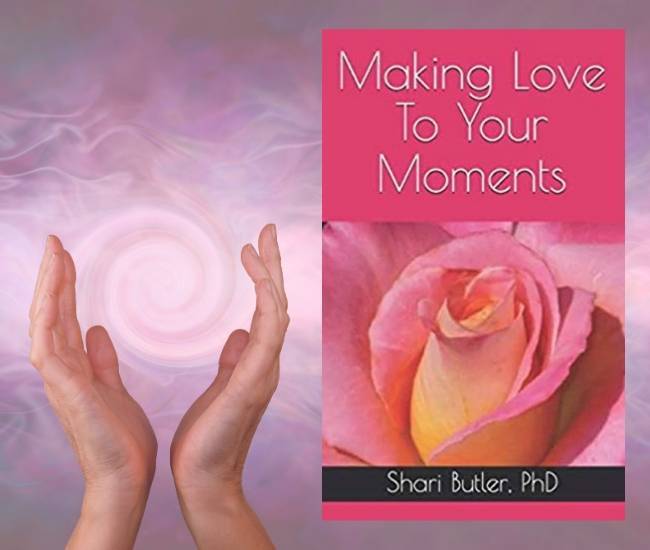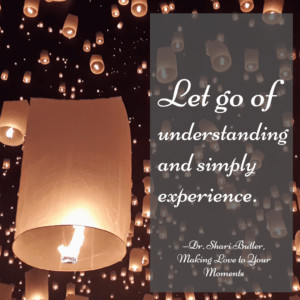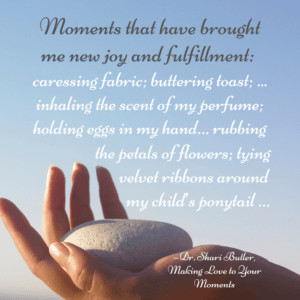Making Love to Your Moments: How to Love Yourself and Your Life by Shari Butler, Ph.D
“Love is my life theme,” states Shari Butler, Ph.D.; she “felt called” to it, even at an early age. Her insightful and compassionate book Making Love to Your Moments: How To Love Yourself And Your Life is the result of many decades of personal reflection and professional experience related to this life theme.
Dr. Butler, a practicing therapist who has already written on the subjects of grief and family therapy in her previous books, now contributes to the literature of mindfulness by putting love at the center of a method for enjoying a more mindful life. Her enthusiastically pro-love approach is inspiring and also distinct from other approaches.
WHAT IS MINDFULNESS AND WHY DO WE NEED IT?
The concept of mindfulness — simple yet elusive — has been taken up and championed by many authors, explained and recommended in various ways, with a wide range of conceptual approaches. Mindfulness originates in Buddhist teachings, in which Sati (mindfulness) is a valued faculty that forms an essential part of Buddhist practice.
This book aligns itself with the ideas of Eckhart Tolle, author of The Power of Now, the highly influential book that initiated the recent groundswell of interest in mindfulness. However, there is a unique distinction between Tolle’s view and Dr. Butler’s: though she appreciates Tolle’s emphasis on allowing one’s presence to occupy each moment, “… I am suggesting something radically different. I am, in a sense, asking you to let go of understanding and simply experience.” In this way, she argues, the ideas of Making Love to Your Moments present “a way of taking the idea of mindfulness to the next level.”
The popularity of the subject of mindfulness today indicates a widespread feeling of dissociation in our society, and a desire to find a cure for the deadening, disconnected feeling that is a symptom of our technologically enmeshed existence.
Dr. Butler explains this epidemic of disconnection as the result of identifying the Self with the mind. The culturally received concept of a mind/body split limits our ability to fully ground the self in the moment. When the Self identifies with the mind, “…mind creates a screen of concepts, labels, images, words, judgments, and definitions,” that replaces the sensations of physical living that actually make up the Now. “It is the screen of thought that creates the illusion of separateness,” writes Dr. Butler.
Making Love To Your Moments offers the reader “practical ways to enhance your connection to yourself and your life in concrete ways through the exploration of the sweetness of life through its smallest measure — a moment.”
THE “MLM” METHOD
So how do we “make love” to our moments? Well, according to Dr. Butler, by treating each moment of our lives as if it were a lover. In order to be in the moment, you must allow yourself to be immersed in the Now, allow influences of the sensual world to feed your consciousness and, as it were, merge with the moment, like … a lover. In doing so, you will not only gain “greater awareness of your physical, emotional, and sensual experiences,” but “go beyond feeling better to actually falling in love with your moments.”
Dr. Butler’s writing has an inspirational tone; however, the book also cites scientific studies and insightful quotes from literature to illustrate her points with clear logic.
Exercises are provided to help you MLM (make love to your moments) and are explained in detail to guide you toward a real connection with your activities through mindful habits that teach you to, for example, “Notice the details,” “slow down (way down),” and “assess whether your moments feel wasted or treasured.”
She also does a good job explaining exactly how insights into our emotions during our activities can be the pathway to mindfulness, and how allowing vulnerability is an essential part of opening us up to moments.
Wabi-Sabi, another concept that is, like mindfulness, of Buddhist derivation, is also incorporated by the author into the MLM method. Wabi-Sabi is the recognition of the beauty of the “perfectly imperfect life,” of beauty that is “imperfect, impermanent, and incomplete.” It is a concept that reminds us that the unconditional love of “what is” is a path to emotional freedom.
FALLING IN LOVE WITH YOUR MOMENTS
Making Love to Your Moments is unapologetically love-drenched, at times rhapsodically so:
“… Moments that have brought me new joy and fulfillment include — caressing fabric; buttering toast; enjoying the scent of the food that I am cooking; inhaling the scent of my perfume; holding eggs in my hand … rubbing the petals of flowers; tying velvet ribbons around my child’s ponytail; and listening to music until the face of a past love emerges from within…”
This rich, generous attitude toward all (“yes, all moments”), this all-encompassing sensuality, is part of the cure, and Dr. Butler does not shy away from proclaiming it, and urging us to acknowledge that “Life is fascinating, beautiful, gorgeous, bountiful, sweet, and endlessly graceful.”
Making Love to Your Moments offers us an interpretation of mindfulness that has a spiritual core, its true meaning and purpose essentially concerned with filling us with what the author calls “source energy”: “some may call this the essence of the Divine, which spills into everything you do each and every day.”
This is a big little book: brief, easy to read, but with the potential to enhance every aspect of your existence.
Buy this Book!
Amazon







